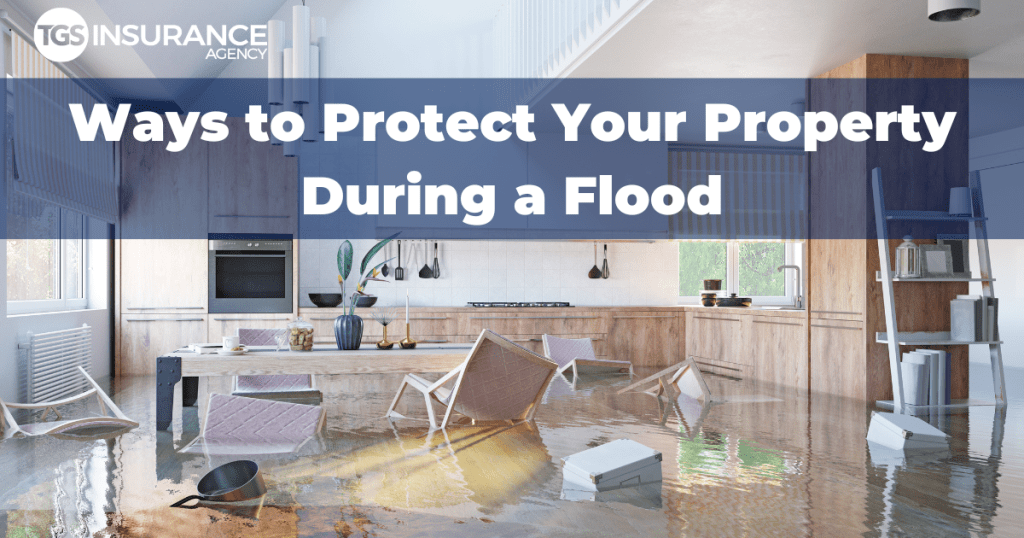
There are many headaches that hurricane season can bring, but one of the biggest is the prevalent threat of flooding. Floods are life-threatening, city-altering, property-destroying events that can be beyond devastating when unprepared. Here are some tips to protect your property during a flood.
Purchasing the right flood insurance policy and having coverage on your auto policy can help you start protecting yourself. There are practical steps homeowners and auto owners can take to limit the damage. Even if you aren’t in a “flood zone,” 20-25% of flood claims come from non-flood zones. According to FEMA, it is essential to remain prepared as we begin another storm season.
Have a Storage Plan
If you have a two-story home, consider dedicating a place for storing important documents. Storing priceless family heirlooms and other important things on the second floor or attic may save them. Knowing how you will store things, where they are, and what items get prioritized will help you when storms approach. Prepare a checklist and organize it beforehand to ensure all bases are covered. Even cars may need a storage plan for low-lying individuals. If you are in an area where your home may flood and can legally and safely park your car in a higher domain, consider doing so to help protect against loss. Even if your insurance policy covers it, the hassle and impact that a loss of transportation brings can be enormous obstacles to overcome.
Have The Right Insurance Coverage
It’s a common mistake to think homeowners insurance will cover damages to their homes due to a flood. While you can expect some coverage, you’ll need a flood insurance policy to get complete protection. On average, in Texas, your policy can be around $699 per year. That can fluctuate higher or lower based on where you live. TGS Insurance can help you find the best policy to cover your home’s valuables. So, should a flood arise, you can rest assured that you’re completely protected!
Document Everything With Detail
When disaster strikes, the last thing you want is to have an insurance claim rejected due to a lack of proper documentation. Be sure to brush up on your insurance policies to understand what they cover, and speak with your agent about any questions you may have. From here, you can begin documenting the things you have worked for in the event a flood should occur. Remember to record times and dates, as your insurance provider may need this information for your claim and any steps you and your family take to prevent loss during the flood. Documenting the process and the property that requires protection can go a long way should you need to make a claim.
Raise Valuables From the Ground
As mentioned, storing things in your attic or a second floor can help prevent the loss. Still, even if a flood doesn’t rise to that extremity, raising items you wish to save can go further. Even a few inches of water can bring tremendous damage, and you may have to toss or clean something that could have avoided destruction. Some ideas for raising items include:
- Put expensive electronics on top of your bed, counters, or tables.
- Pick up food that you may store at a lower level.
- Store your pet’s food and water away from the ground so it is not contaminated.
- Secure more oversized items if you can safely perform such DIY projects or secure them through a professional service (air conditioners, furnaces, etc.)
If it’s on the ground and you need to save it, place it in a higher place for the time being. Raising your valuables will help give you a bit more peace that should harm befall your home and can minimize the damage.
Turn Off Your Electricity When Possible
Electricity and water aren’t best friends; mixing the two can be expensive and dangerous. You can help limit hazards and damages by cutting power to sections of your home at risk of flooding. Turning off your power can minimize the damage to internal components and the risk of unknown electrical currents in floodwaters. It is important to remember that when messing with electricity, always use safety and that because this is a flood event, residents should be cautious when performing this task and only perform it if it is safe to do so.
Be Aware of Your Surroundings
Knowing what you are going up against before it strikes your car or home can go a long way in protecting them. Flash floods can occur at a rapid rate and can strike in an instant. Monitoring your surroundings from a safe location, such as the second story of your home, and staying up to date with reliable news and updates can go a long way. Be sure to speak with neighbors you trust and contribute to neighborhood groups with pictures and accounts to help spread relevant knowledge. If you wander outside your home, it is best to follow local government and official guidelines, avoid all flooded areas and watch for debris and hazardous components such as fallen power lines.
We always strongly advocate for our customers to take all necessary precautions in case disaster strikes. Knowing what to do before and after a flood will prepare you better and thank yourself in the long run.
Instant Home Insurance Quote
Recent Home Insurance Articles:
- Thanksgiving Fire Safety: Protect Your Home, Your Family, and Your Peace of Mind
- Fall Home Maintenance Checklist: Prevent Costly Insurance Claims Before Winter
- Who Needs to be Listed on Homeowners Insurance
- Does Homeowners Insurance Cover Mold?
- Actual Cash Value vs. Replacement Value: What’s the Difference, and Where Does Market Value Fit In?